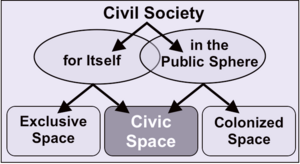City Wiki
A city wiki is a web site that serves as a knowledge base and social network for a specific city, town or village. Smaller communities that surround the main city (suburbs, unincorporated areas, metro regions, etc.) are sometimes associated with a city wiki, even if the particular geographical entity is also represented by its own wiki. The "wiki" feature of the web site suggests that the web site's software allows for easy content contributions from the community.
PortlandWiki is a city wiki dedicated to serving as a knowledge, information and social hub for Portland, Oregon. An additional goal for PortlandWiki is to give voice to the many communities that make Portland the marvelous city it is.

Why create and maintain a city wiki (or civic wiki)?
Perhaps you're familiar with the Nigerian Igbo proverb "Ora na azu nwa" (It takes the community/village to raise a child), or at least with the version of this proverb that found its way onto a book by Hillary Rodham Clinton[2] or by children's author Jane Cowen-Fletcher.[3] Similarly, it also takes healthy communities to make a successful society.
Throughout the ages, healthy human communities have benefited from common areas where individuals and groups from the community came together to exchange information, knowledge, gossip, goods, services and so on. In hunter-gatherer societies, a community commons might consist of the simple community campfire, or extend to a much larger "common-pool resource area"[4] shared by more than one tribe. Later, as humans formed into agrarian and industrial societies, parks, plazas, the village commons and similar spaces accessible to the whole community opened up.
An established commons often fell under the covetous gaze of one powerful interest or another. In fact, the real "tragedy of the commons" was not its over-exploitation by its legitimate stewards, as posited by Garrett Hardin[5], but the constant temptation felt by a few to take it from the community. Indeed, the main threats to a given community's commons usually involved its expropriation for private gain of one sort or another.
References
- ↑ Civil Society for Itself and in the Public Sphere: Comparative Research on Globalization, Cities and Civic Space in Pacific Asia (Douglass 2003)
- ↑ It Takes a Village, By Hillary Rodham Clinton
- ↑ It Takes a Village, By Jane Cowen-Fletcher
- ↑ Land Tenure: Common-pool Resource Areas
- ↑ "The Tragedy of the Commons", By Garrett Hardin (Published in Science, December 13, 1968)
External Links
- City wiki | Wikipedia's City Wiki page.
- Association of City Wikis | Google Groups page.
- Guidelines for running a City Wiki | (Cached version courtesy Archive.org. Original page no longer available.)
- Civic Wiki -- a wiki for your city, town, or region | A Facebook discussion page for civic wikis.
- PortlandWiki.org | PortlandWiki Is A City Wiki For Portland, Oregon. | This is PortlandWiki's AboutUs page.
- Local Search Marketing on Civic Wikis | RichmondWiki's Andrew Miller discusses how civic wikis can potentially benefit local businesses in a given community.
- THE FULL WIKI's City wiki: Reference augments content found on Wikipedia's City Wiki page with additional content, like a list of known city wikis.